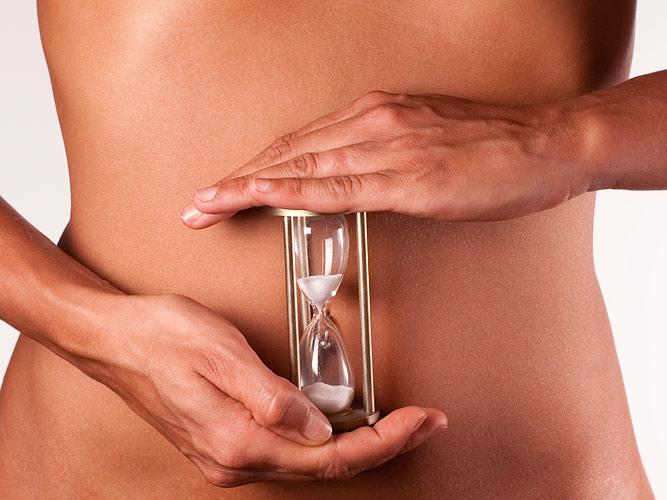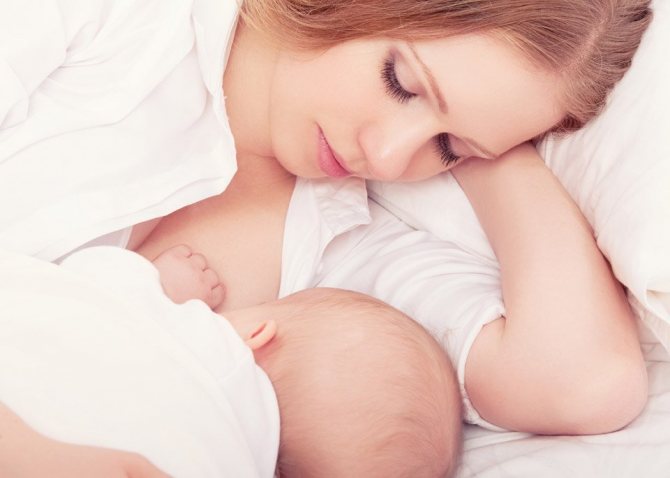Changes in the body after childbirth
Immediately after the end of childbirth, a woman begins the process of restoration of her reproductive organs: the cervix, internal pharynx, birth canal - all organs return to the state they were before pregnancy.
Establishing the menstrual cycle - an important indicator of women's health - depends on the following factors:
- hormonal levels;
- psycho-emotional state of a woman;
- adherence to sleep and wakefulness;
- physiological characteristics of the body;
- heredity;
- complications during childbirth;
- nature and volume of nutrition;
- breastfeeding or using formula.
Women often note that after childbirth the frequency and nature of menstruation changes. Possible deviations from the norm are shown in the table:
| Characteristic | Indicators are normal | State of affairs after childbirth |
| Duration | From 3 to 7 days | Less than 3 days and more than a week |
| Volume of blood released | Minimum 50 ml, but not more than 150 ml per day | Scanty or too much discharge |
| Cycle duration | From 21 to 34–35 days | Less than 3 weeks and more than 40 days |
| State before the start of the cycle | Normal health, stable emotional background | The appearance of premenstrual syndrome (mood swings, dizziness, nausea) |
| Painful sensations | None | Appear with varying degrees of intensity |
The irregular menstrual cycle after childbirth and the above signs of deviation from the norm disappear on their own 8–10 weeks after the birth of the newborn. If this does not happen, the woman should immediately seek advice from a gynecologist.
When does your period come after breastfeeding?
After breastfeeding, periods can be restored in different ways. Sometimes they come immediately after the woman has finished breastfeeding, sometimes only after 1-2 months. This is due to the fact that for some time the hormone prolactin can be produced in fairly large quantities, so to speak, by inertia.
If the child refuses the breast on his own, menstruation will begin earlier, since this usually happens gradually - the baby eats less and less, and in the end does not ask for more breast. The body reacts sensitively to this and the amount of prolactin and milk also gradually decreases, which means that the restoration of the cycle is not delayed.
If the child had to be weaned for external reasons, then after breastfeeding is discontinued, in this case, menstruation may be delayed. It will take time for the body to understand that milk is no longer needed. Normally, such a delay lasts a month or two.
It also happens the other way around - breastfeeding continues, but the cycle has already been restored. This is usually associated with the introduction of complementary foods and the abandonment of night feedings. The child eats less milk during the day and does not stimulate prolactin at night, so the cycle is restored earlier. Read a detailed article about periods while breastfeeding.
Many women believe that they are unable to become pregnant before their first period. But you should understand that before your period, as a rule, ovulation occurs - and if the “stars align”, then it is absolutely enough to get pregnant and not wait for your period. And become the mother of charming weather.
Similar article - Anakom noodles composition
However, the restoration process does not end there. After lactation, periods may differ significantly from the usual picture for some time.
Why are there delays?
The most common reasons for irregular periods after childbirth are:
- dysfunction of the endocrine system, which manifests itself in the form of decreased secretion of the hormone estrogen;
- diseases of the reproductive organs (polycystic ovary syndrome) and inflammatory processes;
- a consequence of an acute infectious disease;
- tumor growth in the ovaries or uterus;
- overwork of the body, vitamin deficiency;
- postpartum pituitary infarction, which ceases to give signals for the release of necessary hormones;
- new pregnancy;
- frequent childbirth;
- prolonged postpartum depression.

A change in the duration of menstruation is a sign of dysfunction in the normal functioning of a woman’s reproductive system. A possible cause is uterine fibroids or endometriosis. An increase or decrease in the volume of menstrual blood is also considered a symptom of inflammation of the genital organs.
When should your period start after childbirth?
Immediately after the birth of a baby, a woman is faced with different situations. The recovery period of the menstrual cycle depends primarily on the amount of milk produced and the duration of breastfeeding.

Menstruation should begin 8 months after birth when complementary foods are introduced at 6 months.- Having periods and then not having them for a long time while breastfeeding is not a worrying symptom.
- It does not matter how the child was born - by natural birth or by caesarean section.
- With combined feeding, periods can begin as early as 3 months after birth. But their delay of up to 6 months is considered within the norm if the woman does not stop breastfeeding.
- The period between the onset of menstruation during breastfeeding and the next menstruation ranges from 1 to 6 months.
- Due to the long restoration of hormonal levels in a woman’s body, menstruation after breastfeeding may be absent for up to 1 year.

After stopping night breastfeeding, prolactin levels decrease and the amount of milk decreases. Periods appear faster.- During breastfeeding, periods change in quantity and duration. Menstruation during lactation lasts less than usual, discharge is often scanty.
In order to quickly restore the menstrual cycle after the end of breastfeeding, you need to eat right, follow a rest and sleep schedule, and not be nervous. In general, it takes about 8 months for the body to recover after childbirth. When your period should start, you can ask your doctor. It is necessary to discuss any situation regarding the health of wasps with a specialist. You should see a doctor a month after giving birth. Then, according to the doctor’s testimony, at your own discretion. Menstruation returns within 2 years after childbirth. May differ from menstruation before pregnancy.
The regularity of the menstrual cycle is considered one of the main indicators of women's health. Even minor failures may indicate the development of pathology, but not always. Delayed menstruation during breastfeeding is considered a natural phenomenon. The timing of the arrival of critical days in this case depends on several factors, which every woman should know about.

Menstrual cycle while breastfeeding
Irregular periods after childbirth during breastfeeding are associated with the production of prolactin by the female body. The main function of this hormone is to influence milk production and ensure normal lactation. However, it suppresses the ovaries, blocking the maturation of the egg.

Due to the high content of prolactin, the uterus does not grow the endometrium, and ovulation does not occur. Nature intended this so that the female body, depleted by pregnancy and childbirth, restores its functionality.
Normally, irregular periods after childbirth during breastfeeding fall within the usual periodicity immediately after the baby stops applying to the mammary glands.
How to restore your cycle after childbirth?
Restoring the menstrual cycle after childbirth is a long process. At the same time, the speed of restoration of the reproductive system is often influenced by a woman’s compliance with certain rules. This is what doctors advise:
- Maintain a daily routine and get plenty of rest.
- Enrich your diet with fresh vegetables and fruits, meat and dairy products.
- Engage in the correction of chronic diseases that existed before pregnancy.
Restoring the cycle after childbirth while breastfeeding
In order for menstruation after childbirth during breastfeeding to acquire the same consistency and regularity, the mother must fully follow the doctor’s prescriptions and instructions. Among these, normalization of the diet occupies a central place. So doctors advise him to include more fresh fruits and vegetables. In this case, it is necessary to carefully monitor the reaction of the small organism and monitor the absence of an allergic reaction.
Vitamin complexes play a major role in the process of cycle regulation. At the same time, doctors prescribe multivitamins specially designed for mothers. Among these it is necessary to highlight:
- Elevit;
- Pregnavite;
- Vitrum Prenatal;
- Alphabet.
Restoring the cycle after childbirth with artificial feeding
In order to normalize menstruation after childbirth, cycle restoration is carried out using hormonal drugs. Such medications can be used in women who are not breastfeeding. The duration of hormonal therapy directly depends on the degree of the disorder, stage, severity and symptoms. The selection of a medicine is carried out individually. The doctor determines the dosage, frequency of use and duration of therapy. When restoring the menstrual cycle after childbirth, use:
- Norkolut;
- Pulsatilla;
- Utrozhestan.
Cycle regularity when feeding with formula
When a woman, guided by her own considerations, immediately switches her newborn to formula, menstruation is restored on average after 7 weeks. If both methods of feeding are combined - natural and artificial, then the first menstruation will come in 5 months.
Perinatal complications (sepsis, bleeding) affect long-term recovery, but the method of birth (natural birth or cesarean section) does not affect menstruation in any way.
Irregular periods after childbirth with artificial feeding should become normal within 3 months after their recovery. If after the third menstruation the cycle is still disrupted, this is a signal of the presence of diseases.
You should also urgently contact a gynecologist if a woman has the following symptoms:
- delay longer than 5 months without objective reasons;
- duration of menstruation over 8 days;
- heavy menstrual bleeding, accompanied by severe pain in the lower abdomen;
- blood clotting occurs during menstruation;
- physiological or bloody discharge from the vagina has a previously unusual smell or color.
Breastfeeding and the menstrual cycle
Previously, women who gave birth adhered to the norm: after a year of natural feeding, their menstrual cycle was restored. Today, everything has changed: even a nursing mother, 3-4 months after giving birth, can begin to have completely normal periods. That is, lactation does not always “slow down” menstruation.
There are cases in which a woman does not have periods during the feeding period, but ovulation still occurs - this is why many young mothers become pregnant again. It is completely naive to believe that by breastfeeding you will not get pregnant again! The absence of menstruation is not an indicator that a woman’s body is not ready for fertilization.
Menstruation and feeding are completely compatible things. True, some newborns refuse to breastfeed during their mother’s menstruation due to the fact that the milk does not taste very pleasant.
But for young mothers who have chosen artificial nutrition for their baby, the norm has not changed: 1.5-2 months after birth, periods should resume. Why, after all, do nursing mothers experience menstruation much later than those whose babies rely on artificial nutrition?
During lactation, the hormone prolactin is produced. As a rule, the more a mother breastfeeds her baby, the more prolactin is produced. And prolactin does inhibit menstrual function, but not necessarily for the entire period of feeding! Typically, as soon as a woman stops breastfeeding, the menstrual cycle resumes after 1-2 months. But what to do if the feedings are over, but there is still no period?
If the “long-awaited days” do not come after stopping feeding, or if you do not feed, and after 1.5-2 months menstruation has not arrived, you should definitely contact a gynecologist.
First of all, you have to find out what is happening with your hormonal health and donate blood to:
- prolactin, androgens, progesterone, estradiol;
- thyroid hormones (T3, T4, TSH);
- luteinizing hormone, follicle stimulating hormone.
Nuances when restoring menstruation
A woman’s menstrual cycle after childbirth changes and is no longer similar to the one she had before pregnancy. In this regard, you need to take into account some nuances:
- There is no need to take contraceptives until the frequency and regularity of the discharge is fully established.
- Changes in mood, nervousness and anxiety when getting your period are normal and associated with hormonal fluctuations.
- Repeated pregnancy without menstruation while breastfeeding is unlikely, but possible. In this case, the woman can choose only one thing: give birth to a child or continue breastfeeding.
- Following the principles of a balanced diet is the key to quickly restoring your cycle.
- Physical exercise is advisable, but not too active. Heavy loads will cause bleeding.
- You can take hormonal medications to normalize your periods only as prescribed by a gynecologist or endocrinologist.
Restoration of the cycle and regular frequency of menstruation is a signal from the female body that it is ready for a new pregnancy. There is no need to rush the return of menstruation; the body itself will restore its reproductive functions. However, alarming symptoms cannot be ignored; the sooner a woman consults a doctor, the higher the likelihood of a full recovery.
How does the female reproductive system function during breastfeeding?
Menstruation during breastfeeding is a normal physiological reaction of the body. For most young mothers, the menstrual cycle is restored within 8-10 months after birth, while the lactation period can last up to three years. Myths that there are no periods during breastfeeding, and therefore it is impossible to get pregnant, are nothing more than a myth. It is obvious that he was born based on the opinions of those women who weaned the child early. Yes, indeed, the hormone prolactin, which is responsible for milk production, suppresses ovarian function, as a result of which eggs are not formed. However, for many women, reproductive function is already restored a year after the birth of the baby. This is why a woman can become pregnant, carry and give birth to another child without stopping breastfeeding, and after giving birth continue to feed similar children at the same time. Sometimes a baby reacts negatively to a change in the smell of a nursing mother during menstruation. This problem can be solved simply - just take a shower before feeding, especially since by 10-12 months the child eats every 4 hours.










